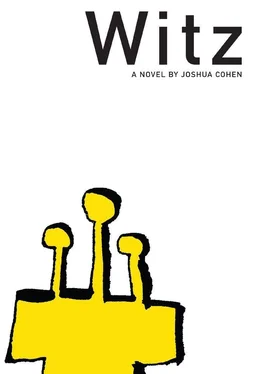Joshua Cohen - Witz
Здесь есть возможность читать онлайн «Joshua Cohen - Witz» весь текст электронной книги совершенно бесплатно (целиком полную версию без сокращений). В некоторых случаях можно слушать аудио, скачать через торрент в формате fb2 и присутствует краткое содержание. Год выпуска: 2010, Издательство: Dalkey Archive Press, Жанр: Современная проза, на английском языке. Описание произведения, (предисловие) а так же отзывы посетителей доступны на портале библиотеки ЛибКат.
- Название:Witz
- Автор:
- Издательство:Dalkey Archive Press
- Жанр:
- Год:2010
- ISBN:нет данных
- Рейтинг книги:3 / 5. Голосов: 1
-
Избранное:Добавить в избранное
- Отзывы:
-
Ваша оценка:
- 60
- 1
- 2
- 3
- 4
- 5
Witz: краткое содержание, описание и аннотация
Предлагаем к чтению аннотацию, описание, краткое содержание или предисловие (зависит от того, что написал сам автор книги «Witz»). Если вы не нашли необходимую информацию о книге — напишите в комментариях, мы постараемся отыскать её.
Meanwhile, in the not-too-distant future of our own, “real” world, another last Jew — the last living Holocaust survivor — sits alone in a snowbound Manhattan, providing a final melancholy witness to his experiences in the form of the punch lines to half-remembered jokes.
Witz — читать онлайн бесплатно полную книгу (весь текст) целиком
Ниже представлен текст книги, разбитый по страницам. Система сохранения места последней прочитанной страницы, позволяет с удобством читать онлайн бесплатно книгу «Witz», без необходимости каждый раз заново искать на чём Вы остановились. Поставьте закладку, и сможете в любой момент перейти на страницу, на которой закончили чтение.
Интервал:
Закладка:
B makes the end of the pier, to a gangplank of sorts, wood flimsy and narrow, makeshift, which is the pier further, just lain. He lifts His head to the good glaciate ship. The MS Yachtsmann, it’s been called; most pronounce it guttural. It’s white, and hugely hulled; a ship heated from within: by its heaving stow of bodies, its own human cargo, the lives of those escaping, inescapable — immigrating, emigrating, depends who you ask and when…their bilged warmth to knife the ship, slicing it through the ice to an outermost flow, cleaving toward the open ocean, in which the waters once divided mingle, flow freely. Or else, such warmth’s from the engines rumbling the moods of every sinner, their appetites, too. Because He can’t seem to find anyone else, though, He stands out on deck alone. To board this boat bound for Polandland, over His family left sunk without wave — His people who were once as plentiful as the waters of the ocean, sandsleeping as dead as the stars whose light’s aged the sky, these however many thousands of years. And, to cross the ocean of our Columbus, you know him: a landsmann of His, landsleit removed, that crypto converso, Saint Marrano he was of the stilled, stilling depths; to travel his ocean in reverse, discovering all that’s to be discovered in the direction opposite, windopposed, the other wayfaring around — having had enough of this exploration, having been barbarized and conquered and settled and exploited enough, enslaved for too long, His life, and yet only now to give His testimony against it, through living against it: to be called to the stand, which is the mast, as a witness bound at the bow. And then, to shriek into the mouth of the wind…what would you say, B, if chanced with the choice; how living against Himself is to prophesize, if only unconsciously, what’s to come, what’s to be. He ships past the smoke clearing, a cloud lifting the clouds, and only because He’s going through the smoke, then through the clouds of the cloud and then — past the ruins of His house out on the Island to be spied land ho off starboard, off port, I don’t know but how could I, left from right from my, Liberty in her soiled robe with her burnt and waterlogged book, what surviving pages stuck fast, her Messianic sandals down below, doesn’t she ever get cold — and up above the scrapers and City Hall, her torch held heavenly and shuddering, a beacon of compromise, perhaps: not sun, not moon, but what; only pointing Him out, directing Him away, a semaphore’s banishing…brandishing that snuffready flame as if to hasten His shipping’s slog — the vessel’s stubborn stub atop and through the Hudson’s ice loosened to melt beneath its progress, toward the verge of frost, the drifty shuga, then a creaking crash to the waters finally unbound, crystalline. And beyond, distancing as far as can be sensed by wind: a lulling swell; as far out as can be imagined and, go further — amid the ocean, the true ocean, not frozen but merely thickened, slushed, an expanse of slowgoing swell: monstrous floes floating elementally in white, bergs hazard blue and serene.
Icesick soon, seablued, seagreened, tempest tost a stomach up through His throat, this vomit’s tongue, I’m feeling. He’s a Lazarus, a wretch risen only to Himself, through Himself, heaving up His resurrection; pacing the deck alone, swabbing the slabs with this tossing, hurling His throw into vacancies available: bulwarks, portholes, lifeboats topside readied to evacuate all of no one. And the ship itself seems alone, as the only vessel to the only horizon, buoyant to bob a rippling shadow, the ocean’s only; any other passenger, B thinks, must be a refugee, too, how they’re staying so low, hidden, out of mind, out of time; no manifest’s survived, to be logged with our losses, such records have been wetted to smudge…and then the crew, a thirdmate, a bosun, a captain, He gets only shades of them, flickers: scuds of mist huddling around corners, puffs gathered at the capstan, the babble of voices always a deck above or below — not a crew it feels but a force ruddering, steering, what power plotting the plod of His course through the cold. The weather, then this sickness, the hollowed throat, that and the stomach an empty purse contained in indigestible coin: a miracle, He doesn’t even showup to meals, if meals are part of His package, part of anyone’s package, if they even are. For the first week until the next Shabbos, He stays berthed in His cabin, rousing only to pace the deck late, drymouthed on water, and knotted in nerves, venous strands of them: salty ties bent to ends loose and capsized, bloodied bit bights with the remains of His frenulum and anything else sublingually left, tangled intricately, mucosal, scarstitched, hanging a fraylach from the stump of His face. The wind echoes in the bell of His mouth, then resounds in the clap of His tonsils. That Friday late, He bows over the railing, over the side. A Kiddush’s sip, why can’t I, only a sip.
O the Kinneret, which is the lake to be found under the Sea of Galilee…the Mediterranean Nile, the Mississippian Jordan, the Sambatyon, the Dead Sea, the Red Sea of Reeds — there is no greater justification of the Fall than our naming of water. All our rivers, streams, lakes, and even the seven oceans, too, are but a oneness of an ocean and God. There is no better evidence of our corruption than our calling of water by name, no better argument for the sundering of the covenant, the flooding of creation again. And then there’s the weather, the question of what to call that, also, of how to give name to a flux, not to instability but to its opposite, stability, the greatest — which is a station founded upon motion, fundament on wandering, on being everywhere at once and so nowhere, forever. How to call a cloud, a nesting of cloud, clouds, a sky, a giant rumbling then a flash bound as one. Though we have the name Storm, we are still destroyed, foundered upon the world we call rock. No invocation will save us. A sky, get inside; stay there and stay honest. Rage all you want with wind, with light and with wetness, there’s no saint to invoke, there’ll be no salvation. We call it a crow’s nest, though it’s crowless; that bird is off mating with the doves in a land not so cursed. Its perch eclipses the moon — and the world finally, opens. An immense downpour at middlenight, suffusions of lightning like daylight, and the ships shakes, rocks, is thunderously rolled to a sink, hits near a glacier then gets turned around, hits another then is turned round again, swirled as if at bottom’s a drain or a flush — prodded then whirled in a hurling, thrown up then dashed back down to the white of an ever new wave, again. A Shabbos midnight of rainsnow, of snowhail, howling around the hull’s nidified mute…and then settling with it — gradually locking the ship, stilling it in ice made. Immovable. Through the night as the temperature drops, even into the next day — to be captive to the calling above, its lash at the foremast, its whip to the mizzen. Then, toward evening of the end of Shabbos, which reigns upon sea as it reigns upon land, which reigns in the air, too, and then everywhere else there be God, there’s a last bolt of lightning: it pierces the sky, strikes down to smash the ice up ahead, splits the ocean entire…sundering the horizons one darker, one lighter, while the middle melts away into grays — into soon, a steady, steadying pure, the moving water moving, again. And one tribe, and only one tribe, may pass.
Shalom is the name that follows next, meaning Hello, and Goodbye — and so going both everywhere and nowhere at once, but in Peace. B’s ship, He’ll think of it as His ship until another makes topside, floats Shalom in the middle of the peacefully immovable and middleless water, moving at middle: Hello and Goodbye, they’re mingling, the waters wetting each other as if always made undivided, never been sundered, never foundered between those above and those below upon God’s second day. A flow of stasis, under the bandage of the newly calm cloudless sky. It’s here He loses the winds of the world we call New, trading in those for a species of wind that doesn’t blow or push as much as it pulls, tugs Him toward, the meridian east: the brightkindling bow of the ship set amid the middle of the water without middle, it now parts each sucking, hollowfaced gust — pierces; to where the globe turns its cheek, to the face of its father the sun, is then struck with a kiss, lightsmote to blush itself humbled, a sunrise, as you’re flung down to the other edge of the round, where the flatness begins, the vale of the lessdimensioned, divested of west, the endless dark world we call Old. At the landed crown of the rounding before it’s rubbled away to flat, a last standing shadow, lengthening with the thrift of the day; it’s a female form, if not emblematically feminine. A ship’s figurehead stranded, could be, straining from her perch at beached prow. A maydel not too young anymore, she’s Eli the doctor’s daughter appeared sullen at the pointing, way out on the accusative tip of Manhattan having followed Him, if tentatively or shy: she hadn’t been sure, has to make her lastlit goodbye, maybe even she thought to convince Him, to remain and be hers, impossible, perhaps, this she knows, too late; she’s waving a headkerchief she’s abstractly embroidered as if with the fingers helpmating of widows and kinder unborn: with its wave not exactly bidding Him anything besides her heartache, commending it unto Him if that’s the mood she merits, as if — aval aval, it’s not a headkerchief, it’s a cover for challah, a coverlet for the swaddling of the two tabled loaves from last night, she’d baked; waving, more like she’s shaking out the crumbs her father and mother’ve left her, miserly few and what there are, greasy: she follows the lone ship, her cloth a sail forsaken by wind, sagging Him far, then gone. Out of her life, this gust: a sigh older than God. Had a few prospects over last Shabbos, again: nothing she’s interested in, no one redeeming, forget it, it’s worthless. With Him, He was different. Same old. How her father had said he’d die the night he’d marry her off. Finally. That or retire, or both. And in front of company, too, two corporate attorneys who’d also been patients, calling on her one with a new duster for a present, the other without flowers either. Dad had been calling the both of them Son. One touched feet with a wooden paw of a leg of the table under which the other’d held the hand of her mother. She was going to spit the cream in their coffee, but her mouth was too kind and the maincourse was meat. The last vision this puffy, darkeyed Eli has of His departure, it’s a reflection — the last to be imaged upon the waters of her face with its fallen nose, and those warm, rounded lips — it isn’t the ship, but a huge solitary head rising from the east, as if His return, but lifeless: the new Shabbos’ sun, sliced from the neck of horizon.
Читать дальшеИнтервал:
Закладка:
Похожие книги на «Witz»
Представляем Вашему вниманию похожие книги на «Witz» списком для выбора. Мы отобрали схожую по названию и смыслу литературу в надежде предоставить читателям больше вариантов отыскать новые, интересные, ещё непрочитанные произведения.
Обсуждение, отзывы о книге «Witz» и просто собственные мнения читателей. Оставьте ваши комментарии, напишите, что Вы думаете о произведении, его смысле или главных героях. Укажите что конкретно понравилось, а что нет, и почему Вы так считаете.












